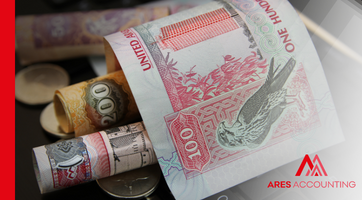The United Arab Emirates are made up of 7 emirates. Only two of them, Abu Dhabi and Dubai, attract the most expatriates to work.
The rights of private sector workers are governed by a federal decree law, known as the UAE Labour Law. It applies to all employees working in the UAE, whether they are UAE nationals or expatriates.
On 2 February this year, the new “Federal Decree-Law No. 33 of 2021” replaced Federal Law No. 8 of 1980 (a law that was over 40 years old). The changes impacted no less than 5 million employees in the country and offer much more flexibility to employees.
This Federal Decree-Law No. 33 of 2021 obliged employers to take measures to ensure their company’s compliance with the new and amended provisions.
But what about the benefits paid to employees at the end of their employment contract in the Emirates?
What is the end-of-service allowance in the United Arab Emirates?
Better known as “end of service”, this notion in an employment contract refers to the date or event from which the employment relationship between the employer and the employee ends.
This may be due to a variety of reasons, such as
- The completion of a specific project;
- The expiry of a fixed-term contract,;
- The death of the worker;
- Dismissal by the employer;
- The resignation of the employee.
It is important that both parties (employer and employee) understand the terms of the contract regarding end of service benefits to ensure that the correct procedure is followed and that any necessary severance pay or benefits are provided. These end of service benefits are known as ‘end of service benefits’.
A distinction should be made between the most common situations in which an employee may receive termination payments:
- When the employee is dismissed by his employer in the United Arab Emirates. In this case, he retains his right to a termination allowance. The employer or his representative may impose certain sanctions on an employee who violates the provisions of the Decree-Law, including dismissal for gross misconduct, while preserving the employee’s right to termination indemnity. The employer may not refuse to pay the employee termination benefits;
- When the employee has reached the end of the contract period;
- When the employee decides to resign from his/her position before the end of the contract.
Method of calculating the allowance
First of all, it should be made clear that contracts concluded before the date of entry into force of the Federal Decree Law (i.e. 15 November 2021) are not governed by it, but by the country’s first Federal Law dating from 1980 (Federal Law No. 8 of 1980) in order to respect the principle of non-retroactivity of the law, which makes it possible to preserve the legal security of workers.
Thus, if the employee signs his or her employment contract after 15 November 2021, and has spent one year or more in continuous service, he or she is entitled to an end-of-service bonus upon termination of the contract which has come to an end.
The bonus is calculated as follows as provided for in section 51 of the Labour Law:
- If a worker has served for less than one year, he or she is not entitled to any gratuity;
- If a worker has served for more than one year but less than 5 years, then his or her end-of-service allowance will be calculated on the basis of 21 days of basic salary multiplied by the number of years worked;
- If a worker has worked for more than 5 years, his or her end-of-service allowance will be calculated as follows: 21 days’ basic salary for the first 5 years and 30 days’ basic salary for subsequent years.
The major change announced by the Ministry of Human Resources and Empowerment (MoHRE) concerns unpaid leave days that will not be included in the final calculation of the employee’s end-of-service allowance.
A tool to calculate your compensation
The Dubai Development Authority has a calculator to help you work out how much your end-of-service payments will be: https://dda.gov.ae/en/gratuity-calculator/gratuity-calculator
Please have the following information ready:
- Start date of your contract;
- The date your contract ends;
- Amount of your basic salary.
The end-of-service allowance is calculated on the basis of the last salary to which the worker was entitled, i.e. the basic salary. It therefore does not include allowances such as housing, transport, utilities, furniture, etc. If the worker owes money to the employer, the employer can deduct this amount from the allowance. All end-of-service allowances must be paid within 14 days of the end of the contract. Finally, the total gratuity should not exceed two years’ salary.
Whether you are an employee of a company registered in the free zone or in the mainland, the same rules apply regarding the calculation of the end-of-service allowance. Furthermore, whether you are dismissed or have decided to resign from your position, the calculation remains the same.



Leave a Reply